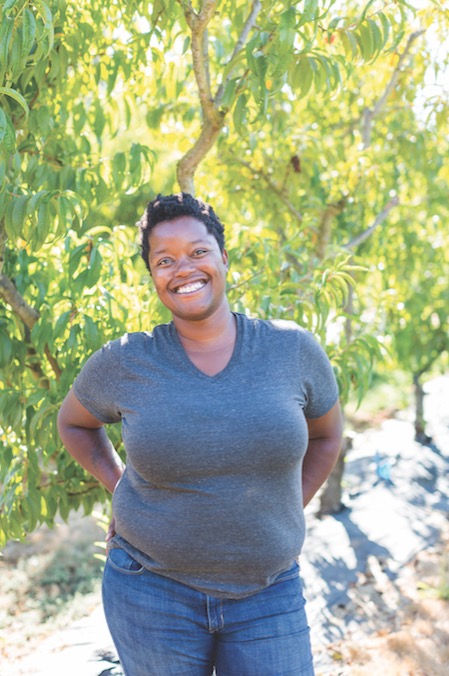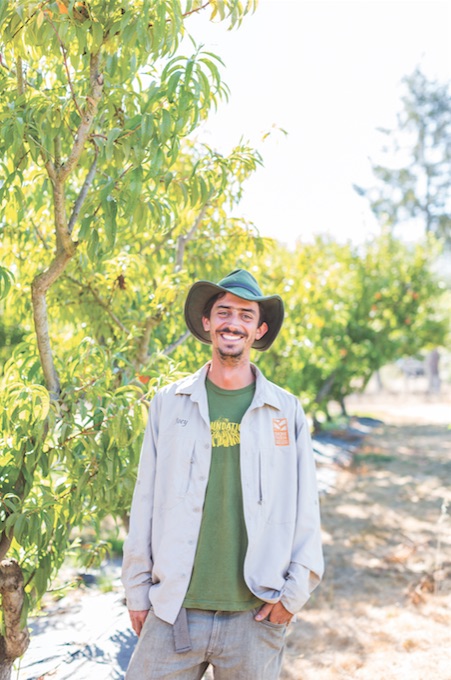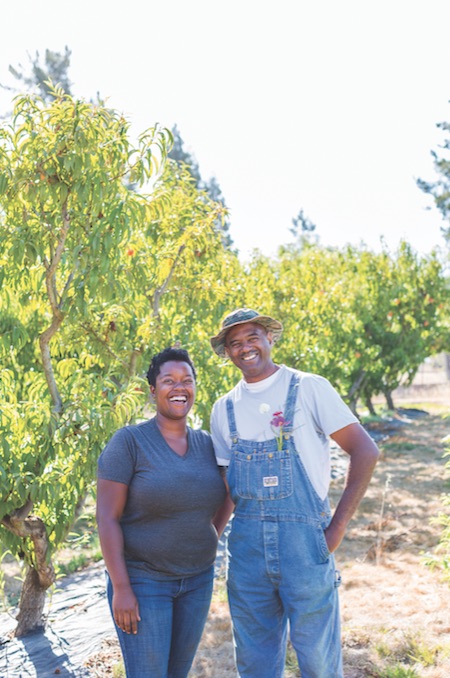Farmer training programs have popped up all over the county, and they teach beginners more than how to grow healthy crops.
Kiley Clark lifts a box brimming with fresh cut heads of lettuce, dew drops still clinging to the tender purple and green leaves in the late morning sun, and strolls over to the walk-in cooler to place the greens on a shelf. The 37-year-old Los Angeles native seems completely at home here at Santa Rosa Junior College’s Shone Farm, where she’s completing a certificate in sustainable agriculture. Like the other student workers who diligently harvest peppers, repair irrigation, and harvest apples, Clark’s reverence for the land is clear. She speaks eloquently about the connection between healthy soil, healthy plants, and healthy people. In Sonoma County, where small farmers are plagued by soaring land prices and tight markets, her determination to run her own local farm is unwavering.
“I actually don’t think there are enough farms here,” she says.
It’s a sentiment that’s shared by the many students, like Clark, who are enrolled in farmer training programs across Sonoma County. Along with SRJC, the Green String Institute and the Permaculture Skills Center Farm School—while offering slightly different academic and practical approaches to teaching sustainable agriculture—all have one overarching goal: to teach more people to grow healthy food.
The oldest of the bunch, Shone Farm, a division of SRJC’s Agriculture and Natural Resources program, was established in 1972. Nestled between Forestville and Windsor, the 365-acre “outdoor learning laboratory” includes forest, pasture, vineyards, olive and apple trees, and space for crop production. In the late ‘90s, the sustainable agriculture program joined existing viticulture, animal and equine sciences, and forestry departments. Students from all concentrations work on the farm, but practical experience with food crops is a requirement for the sustainable agriculture certificate and the two-year associate’s degree programs. Community members can also take individual classes like composting, tractor work, marketing, or crop planning to brush up on their skills.
“No one knows everything about farming,” says Joshua Beniston, SRJC’s sustainable agriculture program coordinator. “We offer this service in this community, which has historically been an ag region, where we can learn more about agriculture and share knowledge.”
In fact, more than half of the instructors run their own farms. Garden coordinator Joey Smith has worked at Shone Farm for five years. For that same amount of time, he’s run Let’s Go Farm, a 1 1/2-acre mixed vegetable operation on his family’s land in Santa Rosa. Smith says that the students he works with come from a variety of backgrounds; while most are from Sonoma County, they’ve also come from other parts of the Bay Area and the country. Many are guided by the dream to be full-time farmers but not all.
“Plenty of people can benefit from [the program] if they dip their toe in or jump in,” says Smith. “Our role is casting a wide net and reaching people who want to learn more about how to grow food.”
Clark jumped right in. Originally from South-Central Los Angeles, she lived in Oakland for nine years before moving north. While living in the East Bay, she worked as a pastry chef, baker, and barista, and was driven by a desire to “change her relationship with food.” The first in her family to graduate from college, Clark transitioned from cooking to farming out of a desire to be outside more, own her own business, and be a good steward of the land. She now calls Fitch Mountain home, where she lives with her wife. And while she said she wasn’t totally prepared for the cultural differences between Oakland and Sonoma County, she is settling in and plans to build her business with “as small a radius of travel as possible.” Clark is bulking up her skills with classes in Quickbooks and marketing, and working with a business mentor from SCORE. She has embraced social media with an active Instagram account.
“I know I’m an anomaly here, but it’s great,” she says, acknowledging her position as one of the few black farmers in Sonoma County. “As a farmer, you have to be okay with being uncomfortable in situations. You’re not only selling vegetables, you’re selling yourself.”
As to be expected in a historically agricultural area, SRJC doesn’t offer the only farmer training program around. The Green String Institute in Petaluma and the Permaculture Skills Center Farm School in Sebastopol also offer training in sustainable and regenerative agricultural practices.
The Green String Institute and the Green String Farm were founded in 2000 by vintner Fred Cline and Bob Cannard, the farmer whose crops became the basis of Chez Panisse’s impeccable vegetable dishes three decades ago. Every three months, a small group of passionate, wide-eyed interns from all over the world descends upon Green String Farm, a utopia of tasty fruits and vegetables, drawn in by Cannard’s notion that humans must “grow soil as they grow people.” The Green String curriculum strikes a balance between feeding the soil and feeding people through composting, cover-cropping, seed selection, irrigation, woodworking, chainsaw use and maintenance, and farm economics. It’s one of the only local training programs that pays its students to work on the farm. The mission, as stated on Green String’s website, is to develop soil and plant health instead of fighting diseases and pests. Ideally, explains Cannard, over generations, that mission could change the human relationship to agriculture and the earth.
Madi Howard, 22, a Green String student, arrived with some farming experience through World Wide Opportunities on Organic Farms (WWOOF) and concerns about the affordability and accessibility of healthy food.
“A lot of young people I know are turned off by how exclusive this movement is,” says the Marin native. “But, the future of farming could be more accessible and community-based. If you really care about it, you join it and do something about it.”
Cannard, who taught at SRJC for 23 years, envisions a future where the Sonoma County marketplace supports more farmers.
“If there’s a population of 500,000 people in the county, and they each spent two dollars a day on good food, one million dollars a day could easily support small farms,” he says.
Cannard would love to see all of his students become farmers. He has practical economic examples of how this might work. Like, perhaps, an “urban tea garden” that grows and produces tea as a centerpiece of a community. No matter where his students end up, he hopes they will educate others about the importance of ecologically growing nutritious food.
At the Permaculture Skills Center Farm School, the aim is to “place people into their regional food economy,” says director Miriam Volat, a soil scientist by training.
The school grew out of a desire to expand the scope of permaculture: “How can we harness the energy out of the permaculture movement and turn it into people growing more food?” Volat and her colleagues wondered. “How can we actually make them good farmers?”
Farms in Sonoma and Marin serve as classrooms and models over the course of the 10-week intensive program. The school’s current cohort includes a second-year farming couple, two mothers who want to turn their collective farming experience into a business, a woman from a farming family who wants to transition out of the wine industry, and an ecologist with no practical farming experience.
Once the training ends, the school offers continuing support in the development of business skills. Graduates are matched with paid farming mentors. An incubator program gets new farmers on established farms as apprentices or journeymen that can start their own businesses on other people’s land.
Only in its second year, the Farm School is an evolving process, but the mentorship program in particular has gained momentum with interest from partners like University of California Cooperative Extension (UCCE) and Shone Farm.
Post-training programs are key to keeping beginning farmers in business, says Linda Peterson, the former coordinator of UCCE’s Agropreneurship Program. She is now working with Volat on the mentorship project.
“Farming is a risky business,” says Peterson. “When you’re starting out you’re not going to make a lot of money…an incubator farm allows [beginning farmers] to practice without losing their shirt.”
Like incubator farms in other parts of the country, their vision would allow farmers to pay below market rate for the land, infrastructure, and mentoring with a minimal increase each year as, presumably, the businesses become more successful.
Perhaps if there was more support for beginning farmers like this, Peterson says, more people would be equipped to face the challenge of land access. She estimates that about 50 percent of graduates of the agropreneurship program are still involved in agriculture in some way.
“Almost never do I see a farm go out of business because they couldn’t grow food,” says Evan Wiig, the executive director of the Farmer’s Guild. “It’s always because they didn’t know how to run a business.”
In response, Wiig launched the Farmer’s Guild Entrepreneurial Intensive Program, a weekend workshop specifically geared towards people who are financially challenged and serious about farming. Most are first-time farmers on leased land, farmworkers, or food entrepreneurs. The program doesn’t aim to fill the same role as other training programs but, instead, “crowdsources the collective genius of our community,” says Wiig, by bringing in farmers and people from California FarmLink, UCCE and county ombudsmen. The training, he says, is markedly “un-sexy,” offering practical experience with spreadsheets instead of soil.
“It’s about being a smart business person who makes the best use of resources,” Wiig says. “If you want to continue worshipping soil, then this is the kind of stuff you really gotta be able to do.”
Louis McKenzie, 51, draws on business skills learned from “previous lives” as an auto mechanic and licensed general contractor to run his Twin Palms Ranch in Santa Rosa. He spent 10 years earning a sustainable agriculture certificate from SRJC and puts that learning to use every day on the farm he runs with his wife Karen. They started farming slowly by cultivating food for neighbors on five acres of land. Eventually, the couple built up to a vegetable and egg CSA, a farm stand, and restaurant accounts.
A lack of start-up capital is what makes farming truly challenging, says McKenzie. Still, he leads his business with a determination born of first-hand knowledge of the dangers of not eating healthy. In 2006, a liver transplant drastically changed his attitude toward food. His goal (and doctor’s orders) is to quit construction and farm full-time, and he is actively working towards this.
“I’m not afraid of being poor,” he says “I want to be prosperous and have a profitable farm, but I also see the value of improving my land and feeding the community.”
Some say that the key to helping beginning farmers like Louis McKenzie and Kiley Clark is to support them in whatever path they choose. As Beniston and Volat made clear, training programs can do this by working together to fill different students’ needs.
“There is more room for collaboration than there is for competition,” says Joshua Beniston at Shone Farm. “We’d like to form an education alliance where we regularly share information about what everyone is doing.”
Similarly, Joey Smith says the value of training programs is to help everyone envision a multitude of ways to participate in agriculture that’s good for people and the land.
“We have a broad goal of increasing agro-ecological literacy because we’re all in the food system, whether we know it or not.”



